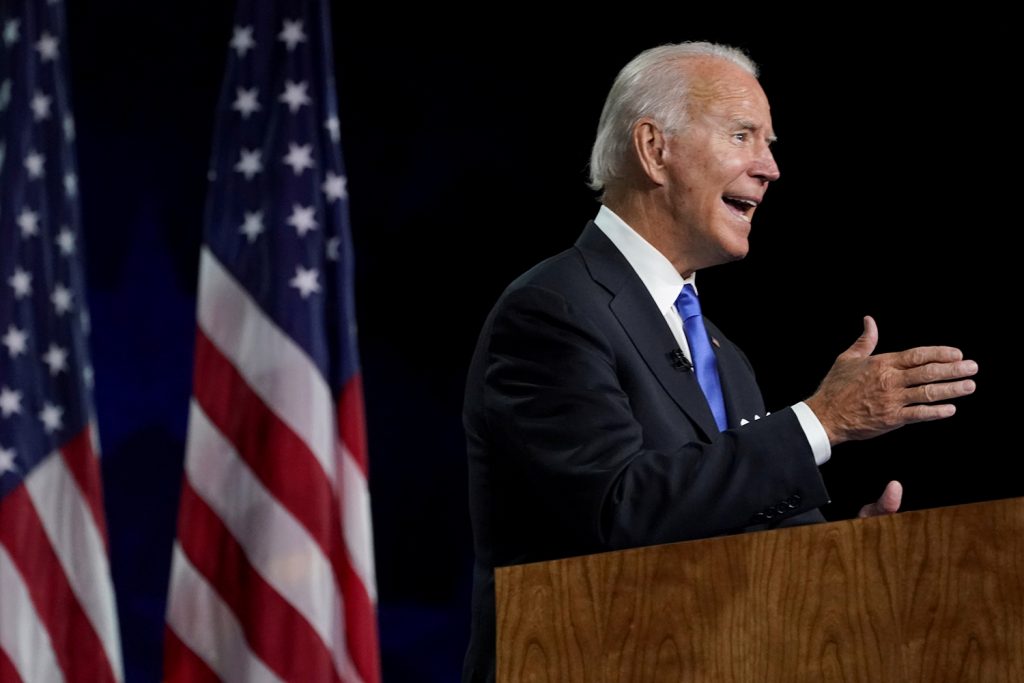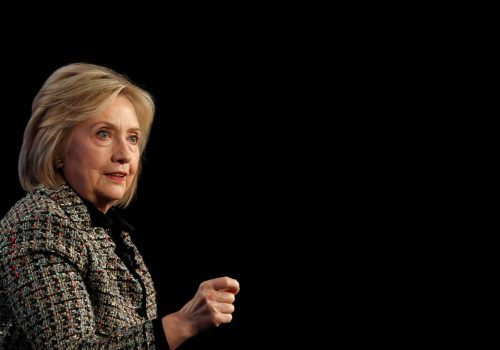On the day after former Vice President Joe Biden formally accepted the Democratic nomination for President of the United States, one of his chief foreign policy advisers said that a future Biden White House would focus its foreign policy on revitalizing the United States at home, rehabilitating frayed alliances, and building a team of democracies to solve the world’s biggest challenges.
Jake Sullivan, who served as deputy chief of staff and director of policy planning for former Secretary of State Hillary Clinton, a top aide to Joe Biden when he was vice president, and a chief foreign policy adviser to Clinton’s 2016 presidential campaign, spoke with Atlantic Council Executive Vice President Damon Wilson on August 21 about how a future Biden administration would shift US policy, emphasizing the importance of rebuilding American domestic strength and its network of global partnerships in the face of growing competition from China and Russia. Here is a brief look at what Sullivan said about a potential Biden administration’s vision for America’s role in the world:
Foreign policy starts at home:
- No success without domestic strength: Sullivan explained that one of the central tenets of Biden’s approach to foreign policy is that the United States “cannot succeed in our foreign policy if we have not invested in our sources of strength at home: in our infrastructure, in our innovation, in our workers, in our immigration system, and yes in our democracy, tackling issues from the strength of our institutions to the ongoing scourge of systemic racism.” While many new administration officials may want to rush to adapt new US policies abroad, Sullivan cautioned that “we have an immense amount of work to do at home,” including dealing with the coronavirus pandemic and battling systemic racism.
- More than just a passing interest needed: He argued that “anyone working on US foreign policy in the United States in the years ahead cannot just take a passing interest in what is happening inside our country because it is so foundational to our capacity to being an effective actor in the world.”
- Getting the house in order to repair America’s image: Regaining the United States’ domestic strength will help rehabilitate America’s global standing, Sullivan argued, pointing out that right now “many folks around the world actually are looking more at places like China than they are to the United States in terms of a successful model for governance and the economy.” By addressing many of the systemic issues in US society, the United States can help remind its international partners of the value of democratic governance and “compete from a position of strength” with Beijing.
A focus on alliances:
- A different approach: Sullivan argued that one of the main differences between Biden and current President Donald J. Trump is their view of America’s allies. While the current US president “sees allies as a liability more than as an asset,” Sullivan explained, Biden “believes that the United States is stronger when it is working alongside like-minded democratic allies to achieve common objectives.”
- Change won’t happen overnight: Sullivan warned that after three years of difficult conversations and spats, a Biden election would not suddenly change partners’ opinion about Washington. US officials will need to start “a conversation where we acknowledge our shortcomings and infirmities, but also point the way toward a better tomorrow,” and also must be “humble about it” and “take our time” to “steadily gain a new respect and greater standing the eyes of the rest of the world.”
- Institutions matter: A Biden administration would also re-engage with international institutions, Sullivan said, in a marked departure from the Trump administration’s skepticism towards organizations such as the United Nations, the World Trade Organization, and the World Health Organization. “The United States has to be at the table in international institutions, helping shape the solutions to big problems that no country can solve on their own,” Sullivan said, highlighting that Biden would focus on reforming these institutions, rather than just “walking away.”
- A new democratic front: But Biden will also go a step further, Sullivan said, and look to build a stronger grouping of like-minded democratic partners. “It is time for the United States to truly pull together the like-minded democracies of the world to develop a set of clear priorities” on issues such as the rise of China, climate change, the COVID-19 pandemic, and trade, Sullivan argued. The focus on democratic nations springs from the belief that “what makes American foreign policy distinctive is that we are not neutral between autocrats and the people seeking basic human rights and dignity. We choose a side.”
Opening priorities:
- 100-day to-do list: Sullivan said some of the first priorities for a new Biden administration would be to rejoin the Paris Climate Agreement and attempt to strengthen it, to rejoin the 2015 Joint Comprehensive Plan of Action (JCPOA) nuclear deal with Iran, to organize a summit of global democracies, to pull US troops out of Afghanistan, and re-evaluate the current state of US-China relations.
- Set new ambitions for Paris: “It is not going to be enough just to go back in to the Paris Climate Agreement,” Sullivan argued, saying that a new Biden administration would also look to “set the next level of ambition, get ourselves there, and then make sure we also at the same time are brining the rest of the world along.”
- Save the JCPOA, then add to it: A new Biden administration would look to quickly reverse the Trump administration’s withdrawal from the JCPOA, but then would also “immediately begin negotiating a follow-on agreement that deals with some over our ongoing concerns with Iran in respect to its nuclear program and its behavior” in the region, Sullivan said. He stressed the need to not just focus on the nuclear issue, but also to work “with regional partners across the board to reduce tensions, to deescalate conflicts, to defuse insipient crises. [That] would mean pushing both our friends and our adversaries in the region toward the [negotiating] table.”
- End “forever wars”: An area of potential agreement with the Trump administration is an emphasis on quickly drawing down US troop presence in the Middle East and South Asia. Sullivan said there is wide consensus across the Democratic Party on the need to “end the forever wars,” and a major priority for a new Biden administration would be to “bring our troops home safely from Afghanistan.”
- Confront Beijing and Moscow, but cooperate too: Sullivan highlighted Biden’s previous experience with both Chinese and Russian leaders in pushing back against their aggressive actions, while also pursuing areas of mutual interest. Biden “knows the dangerous path that Russia has decided to pursue, and he will be robust and vigorous in his response to push him back against that,” Sullivan said, but added that “he will look for opportunities when it is in America’s interest to sit across the table from Russia,” especially on issues like arms control. Similarly, while Biden will “seek to compete from a position of strength” with Beijing, “he will also seek to work with China and any other country on those issues where it can advance the basic purposes of American foreign policy.”
Adapting the toolset:
- Time for refurbishing: Sullivan argued that many of the traditional assets the United States has used to promote its foreign policy are in urgent need of a revamp. “The pieces that the US has to play with… all of them are going to require refurbishing and updating,” including alliances “which will have to be modernized and pointed toward the future” and international institutions “which also will have to be reformed and overhauled as we go forward.”
- Rebalancing civilian and military methods: The US foreign policy establishment will also need a rethink about the way it pursues its objectives, Sullivan said. “We have got to rebalance our national security toolkit in a way that elevates diplomacy and the civilian tools of power over the use and deployment of military force,” he stressed, adding that a general drawdown of US military forces from regions such as the Middle East and South Asia will be replaced with greater emphasis on economic and diplomatic engagement.
- Debate brings new voices: Sullivan also argued that the extensive debates within the Democratic Party through the primary process have highlighted the need to incorporate new viewpoints into foreign policy decision making. “Having the right voices in the room is going to be fundamental,” he said, reporting that Biden is committed to ensuring that labor representatives and environmental activists are included in foreign policy discussions and trade agreements from the start. While many in the media have focused on potential divisions within the Democratic Party on foreign policy, Sullivan countered that there is “more convergence than divergence” between moderates and progressives, specifically on ending the wars, putting the “middle class and working people in the United States at the center of our foreign policy,” and championing global democracies against corrupt authoritarians.
David A. Wemer is associate director, editorial at the Atlantic Council. Follow him on Twitter @DavidAWemer.
Further reading:
Image: Former US Vice President Joe Biden accepts the 2020 Democratic presidential nomination during a speech delivered for the largely virtual 2020 Democratic National Convention from the Chase Center in Wilmington, Delaware, U.S., August 20, 2020. REUTERS/Kevin Lamarque/File Photo



